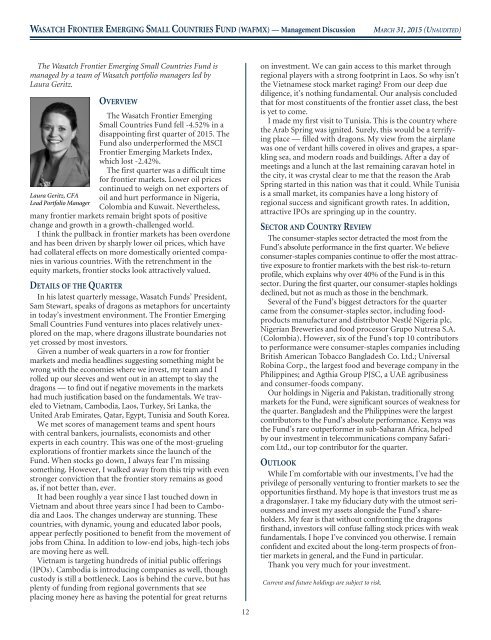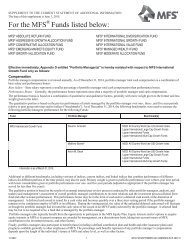WASATCH FUNDS - Curian Clearing
WASATCH FUNDS - Curian Clearing
WASATCH FUNDS - Curian Clearing
You also want an ePaper? Increase the reach of your titles
YUMPU automatically turns print PDFs into web optimized ePapers that Google loves.
<strong>WASATCH</strong> FRONTIER EMERGING SMALL COUNTRIES FUND (WAFMX) — Management Discussion<br />
MARCH 31, 2015 (UNAUDITED)<br />
The Wasatch Frontier Emerging Small Countries Fund is<br />
managed by a team of Wasatch portfolio managers led by<br />
Laura Geritz.<br />
Laura Geritz, CFA<br />
Lead Portfolio Manager<br />
OVERVIEW<br />
The Wasatch Frontier Emerging<br />
Small Countries Fund fell -4.52% in a<br />
disappointing first quarter of 2015. The<br />
Fund also underperformed the MSCI<br />
Frontier Emerging Markets Index,<br />
which lost -2.42%.<br />
The first quarter was a difficult time<br />
for frontier markets. Lower oil prices<br />
continued to weigh on net exporters of<br />
oil and hurt performance in Nigeria,<br />
Colombia and Kuwait. Nevertheless,<br />
many frontier markets remain bright spots of positive<br />
change and growth in a growth-challenged world.<br />
I think the pullback in frontier markets has been overdone<br />
and has been driven by sharply lower oil prices, which have<br />
had collateral effects on more domestically oriented companies<br />
in various countries. With the retrenchment in the<br />
equity markets, frontier stocks look attractively valued.<br />
DETAILS OF THE QUARTER<br />
In his latest quarterly message, Wasatch Funds’ President,<br />
Sam Stewart, speaks of dragons as metaphors for uncertainty<br />
in today’s investment environment. The Frontier Emerging<br />
Small Countries Fund ventures into places relatively unexplored<br />
on the map, where dragons illustrate boundaries not<br />
yet crossed by most investors.<br />
Given a number of weak quarters in a row for frontier<br />
markets and media headlines suggesting something might be<br />
wrong with the economies where we invest, my team and I<br />
rolled up our sleeves and went out in an attempt to slay the<br />
dragons — to find out if negative movements in the markets<br />
had much justification based on the fundamentals. We traveled<br />
to Vietnam, Cambodia, Laos, Turkey, Sri Lanka, the<br />
United Arab Emirates, Qatar, Egypt, Tunisia and South Korea.<br />
We met scores of management teams and spent hours<br />
with central bankers, journalists, economists and other<br />
experts in each country. This was one of the most-grueling<br />
explorations of frontier markets since the launch of the<br />
Fund. When stocks go down, I always fear I’m missing<br />
something. However, I walked away from this trip with even<br />
stronger conviction that the frontier story remains as good<br />
as, if not better than, ever.<br />
It had been roughly a year since I last touched down in<br />
Vietnam and about three years since I had been to Cambodia<br />
and Laos. The changes underway are stunning. These<br />
countries, with dynamic, young and educated labor pools,<br />
appear perfectly positioned to benefit from the movement of<br />
jobs from China. In addition to low-end jobs, high-tech jobs<br />
are moving here as well.<br />
Vietnam is targeting hundreds of initial public offerings<br />
(IPOs). Cambodia is introducing companies as well, though<br />
custody is still a bottleneck. Laos is behind the curve, but has<br />
plenty of funding from regional governments that see<br />
placing money here as having the potential for great returns<br />
12<br />
on investment. We can gain access to this market through<br />
regional players with a strong footprint in Laos. So why isn’t<br />
the Vietnamese stock market raging? From our deep due<br />
diligence, it’s nothing fundamental. Our analysis concluded<br />
that for most constituents of the frontier asset class, the best<br />
is yet to come.<br />
I made my first visit to Tunisia. This is the country where<br />
the Arab Spring was ignited. Surely, this would be a terrifying<br />
place — filled with dragons. My view from the airplane<br />
was one of verdant hills covered in olives and grapes, a sparkling<br />
sea, and modern roads and buildings. After a day of<br />
meetings and a lunch at the last remaining caravan hotel in<br />
the city, it was crystal clear to me that the reason the Arab<br />
Spring started in this nation was that it could. While Tunisia<br />
is a small market, its companies have a long history of<br />
regional success and significant growth rates. In addition,<br />
attractive IPOs are springing up in the country.<br />
SECTOR AND COUNTRY REVIEW<br />
The consumer-staples sector detracted the most from the<br />
Fund’s absolute performance in the first quarter. We believe<br />
consumer-staples companies continue to offer the most attractive<br />
exposure to frontier markets with the best risk-to-return<br />
profile, which explains why over 40% of the Fund is in this<br />
sector. During the first quarter, our consumer-staples holdings<br />
declined, but not as much as those in the benchmark.<br />
Several of the Fund’s biggest detractors for the quarter<br />
came from the consumer-staples sector, including foodproducts<br />
manufacturer and distributor Nestlé Nigeria plc,<br />
Nigerian Breweries and food processor Grupo Nutresa S.A.<br />
(Colombia). However, six of the Fund’s top 10 contributors<br />
to performance were consumer-staples companies including<br />
British American Tobacco Bangladesh Co. Ltd.; Universal<br />
Robina Corp., the largest food and beverage company in the<br />
Philippines; and Agthia Group PJSC, a UAE agribusiness<br />
and consumer-foods company.<br />
Our holdings in Nigeria and Pakistan, traditionally strong<br />
markets for the Fund, were significant sources of weakness for<br />
the quarter. Bangladesh and the Philippines were the largest<br />
contributors to the Fund’s absolute performance. Kenya was<br />
the Fund’s rare outperformer in sub-Saharan Africa, helped<br />
by our investment in telecommunications company Safaricom<br />
Ltd., our top contributor for the quarter.<br />
OUTLOOK<br />
While I’m comfortable with our investments, I’ve had the<br />
privilege of personally venturing to frontier markets to see the<br />
opportunities firsthand. My hope is that investors trust me as<br />
a dragonslayer. I take my fiduciary duty with the utmost seriousness<br />
and invest my assets alongside the Fund’s shareholders.<br />
My fear is that without confronting the dragons<br />
firsthand, investors will confuse falling stock prices with weak<br />
fundamentals. I hope I’ve convinced you otherwise. I remain<br />
confident and excited about the long-term prospects of frontier<br />
markets in general, and the Fund in particular.<br />
Thank you very much for your investment.<br />
Current and future holdings are subject to risk.




